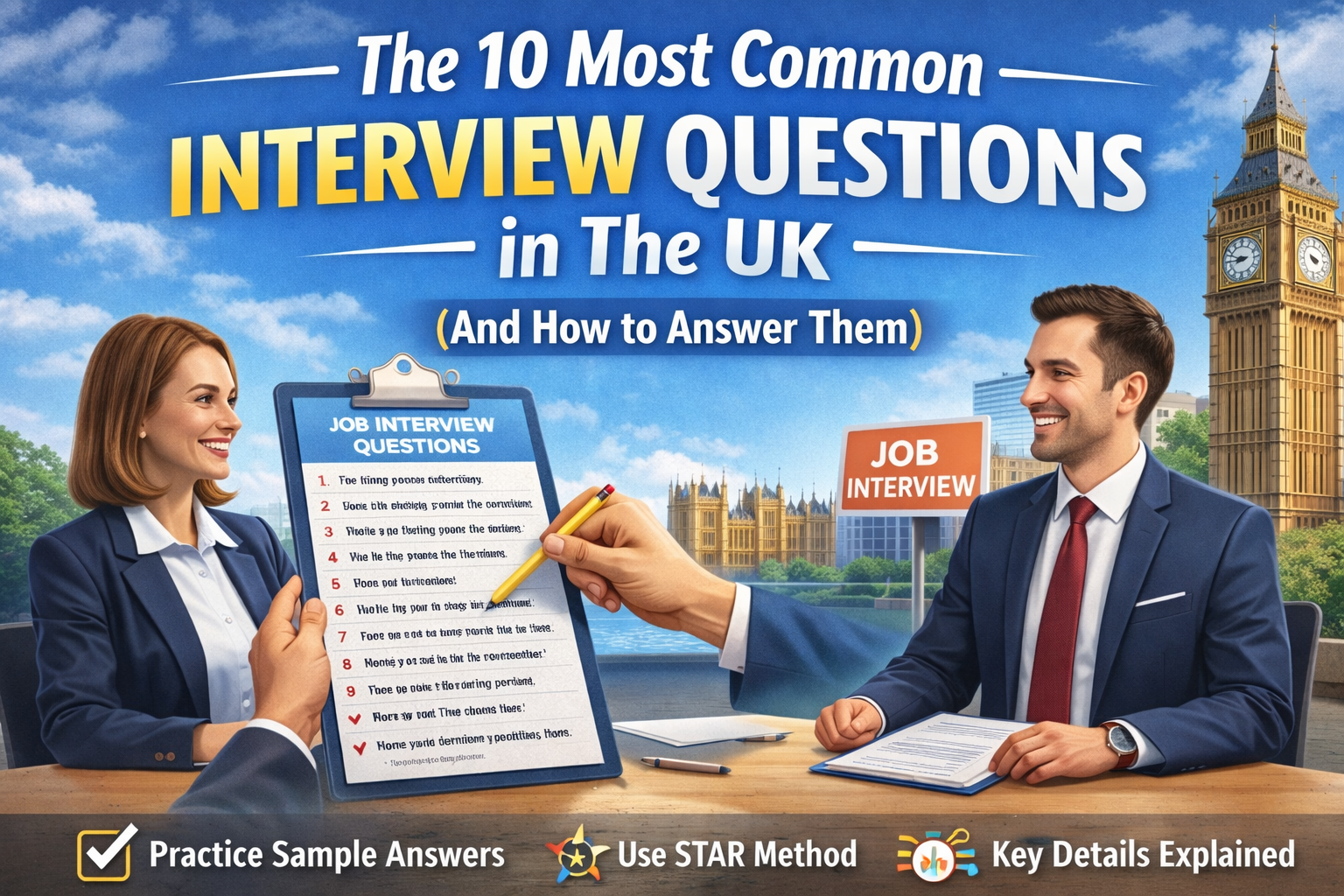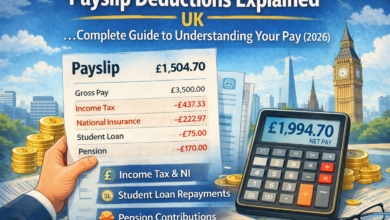The 10 Most Common Interview Questions in The UK (And How To Answer Them)

Walking into a job interview can feel like stepping onto a stage where you’ve not seen the script. But here’s the secret: interviewers in the UK tend to ask remarkably similar questions across industries and seniority levels. Master these 10 most common questions, and you’ll walk into any interview with confidence, knowing exactly what they’ll ask and more importantly, how to answer in a way that gets you hired.
🎯 Why These Questions Matter
These aren’t just random questions pulled out of thin air. Each one serves a specific purpose in helping the interviewer assess:
- Cultural fit: Will you mesh with the team and company values?
- Competence: Can you actually do the job they’re hiring for?
- Motivation: Do you genuinely want this role, or are you just desperate for any job?
- Self-awareness: Do you understand your strengths and limitations?
- Communication skills: Can you articulate your thoughts clearly and professionally?
Understanding the why behind each question will help you craft answers that hit the mark every time.
Question 1: “Tell Me About Yourself”
This is the classic interview opener, designed to break the ice and give you a chance to frame your professional story. The interviewer wants to understand your career trajectory, what drives you, and how your background relates to the role they’re filling. They’re also assessing your communication skills—can you deliver a concise, relevant summary without rambling?
How to Structure Your Answer
Use the “Present-Past-Future” framework:
- Present: Where you are now professionally (current role/status)
- Past: Key experiences and achievements that got you here
- Future: Why you’re interested in this particular opportunity
Keep it to 60-90 seconds. Any longer and you’ll lose their attention.
✅ Strong Example Answer
Before that, I worked at a boutique marketing agency for four years, starting as a junior and working my way up to account manager. That’s where I developed my skills in SEO, content strategy, and client relationship management.
I’m now looking to take the next step in my career and move into a Marketing Manager position where I can lead a team and have greater strategic input. Your company’s focus on innovative SaaS products really appeals to me, and I’m excited by the growth opportunities this role offers.”
❌ What NOT to Say
Why this fails: Too much irrelevant personal detail, no clear narrative, ends on a negative note about being “bored,” and doesn’t connect experience to the role.
- Keep it professional—save personal details (hobbies, family) for later unless directly relevant
- Focus on achievements, not just job descriptions
- Connect your story to why you’re sitting in this interview
- Don’t just recite your CV—they can read; you should add context and narrative
- End with enthusiasm for the opportunity
Question 2: “Why Do You Want to Work for This Company?”
This question separates candidates who genuinely want this job from those who are just applying everywhere. Employers want to hire people who are enthusiastic about the company and will be engaged, motivated employees. They’re also testing whether you’ve done your homework—have you researched the company, or did you just fire off a generic application?
How to Answer Effectively
Your answer should demonstrate that you’ve researched the company and connect your skills/values with theirs. Structure your response around three elements:
- What you know about the company (shows you’ve done research)
- Why that appeals to you (shows genuine interest)
- How you can contribute (shows what you bring to the table)
✅ Strong Example Answer
I was particularly impressed by your recent partnership with the Ellen MacArthur Foundation and your goal to achieve 100% recyclable packaging by 2027. Having spent five years working in supply chain sustainability, I’m excited by the opportunity to contribute to those goals.
What also appeals to me is your company culture. Several of your employees have spoken on LinkedIn about the collaborative environment and investment in professional development, which matches what I’m looking for at this stage of my career.”
❌ What NOT to Say
Why this fails: Focuses entirely on what the company can do for you (salary, location, relief from boredom) rather than what you can offer them. Shows zero knowledge of what the company actually does.
Before any interview, spend at least 30 minutes researching:
- Company website (especially “About Us” and recent news)
- Recent press releases or articles about the company
- Their social media presence (LinkedIn, Twitter)
- Reviews on Glassdoor (but take with a pinch of salt)
- The interviewer’s LinkedIn profile
- Be specific—mention actual projects, values, or achievements of the company
- Connect company values/goals with your own experience and aspirations
- Avoid generic statements like “you’re an industry leader” without backing them up
- Never mention salary, perks, or location as your main reason
- Show enthusiasm—they want to hire people who actually want to be there
Question 3: “What Are Your Greatest Strengths?”
This is your opportunity to sell yourself, but it’s not an invitation to boast aimlessly. The interviewer wants to know if your core strengths align with the skills needed for the role. They’re also assessing your self-awareness—do you understand what you’re genuinely good at?
The Right Approach
Choose 2-3 strengths that are:
- Relevant to the job you’re applying for
- Backed up with concrete examples
- Genuinely things you excel at (they’ll probe further)
Use this structure: State the strength → Give a specific example → Quantify the result
✅ Strong Example Answer
Another strength is my ability to build strong client relationships. In my current role, I’ve maintained a 95% client retention rate over three years, and I’ve successfully upsold services to 60% of my existing clients. I think that comes from genuinely listening to what clients need and always following through on commitments.”
❌ What NOT to Say
Why this fails: “Perfectionist” is a cliché that screams “I struggled to think of a weakness and turned it into a strength.” No specific examples. Generic claims anyone could make. No connection to measurable results.
- Analytical thinking: “I excel at breaking down complex problems and using data to inform decisions…”
- Leadership: “I’ve successfully led teams through challenging projects by…”
- Adaptability: “I thrive in fast-changing environments. For instance, when our company pivoted to remote work…”
- Communication: “I’m skilled at translating technical information for non-technical stakeholders…”
- Commercial awareness: “I understand how my role impacts the bottom line, which helps me prioritise…”
- Match your strengths to the job description
- Always back up claims with specific, measurable examples
- Avoid overused clichés like “perfectionist” or “workaholic”
- Don’t just list traits—tell a mini-story that demonstrates each strength
- Confidence is good; arrogance is not—strike the right balance
Question 4: “What Is Your Greatest Weakness?”
This is possibly the most dreaded interview question, but it’s not a trap. Interviewers ask this to assess your self-awareness, honesty, and commitment to personal development. They don’t expect you to be perfect—they want to see that you’re reflective about your limitations and actively working to improve.
The Strategy
The trick is to choose a real weakness (not a strength in disguise) that:
- Won’t disqualify you from the role
- You’re actively working to improve
- Shows self-awareness and maturity
Use this framework: State the weakness → Explain the context → Describe what you’re doing to improve → Show progress
✅ Strong Example Answer
I joined a local Toastmasters group where I practice speaking in front of others every fortnight. I’ve also volunteered to present at team meetings more frequently, starting with smaller presentations and gradually building up. Just last month, I delivered a 20-minute presentation to a group of 40 stakeholders, which went really well—I actually received positive feedback from my manager about how clearly I communicated our project updates.
I still get nervous before big presentations, but I now have strategies to manage that, and I’m definitely more confident than I was a year ago.”
❌ What NOT to Say
Option 1 (The Humble Brag): “I suppose my biggest weakness is that I work too hard. I just care so much about doing a great job that sometimes I forget to take breaks!”
Option 2 (The Deal-Breaker): “I’m terrible with deadlines. I always end up submitting things late because I lose track of time.”
Option 3 (The Cop-Out): “I can’t really think of any weaknesses. I’m pretty good at most things.”
Why these fail: Option 1 is an obvious attempt to disguise a strength as a weakness—interviewers hate this. Option 2 identifies a critical flaw that would make you unemployable. Option 3 shows zero self-awareness and comes across as arrogant.
- Technical skills you’re learning: “I’m still developing my advanced Excel skills, so I’ve enrolled in an online course…”
- Delegation: “I sometimes struggle to delegate because I want to ensure quality, but I’m learning to trust my team more…”
- Patience with slow processes: “I can get frustrated when projects move slowly due to bureaucracy, so I’m working on…”
- Detail focus vs. big picture: “I sometimes get too focused on details and lose sight of the bigger picture, so I now…”
- Never say “I don’t have any weaknesses” or “I’m a perfectionist”
- Choose a real weakness, but not one that’s critical to the role
- Always focus on what you’re doing to improve
- Show evidence of progress—this demonstrates commitment to self-development
- Keep it professional—don’t mention personal flaws unrelated to work
Question 5: “Why Should We Hire You?”
This is your moment to close the sale. The interviewer is essentially asking: “Out of all the candidates we’re seeing, why should we pick you?” It’s your chance to summarise your value proposition and directly address how you meet their needs.
How to Nail This Question
Your answer should hit three points:
- Skills match: You have the specific skills they need
- Proven track record: You’ve delivered results in similar situations
- Cultural fit: You’ll thrive in their environment
✅ Strong Example Answer
First, I have the exact technical skill set you’re looking for. You mentioned needing someone with expertise in SQL and data visualisation—I’ve spent the last four years working as a data analyst, building dashboards in Tableau and writing complex SQL queries daily.
Second, I’ve successfully done what you’re asking this role to do. In my current position, I transformed our reporting process, reducing report generation time from three days to three hours, which freed up significant time for strategic analysis. You mentioned wanting to improve efficiency in your data team, and that’s precisely what I’ve demonstrated I can deliver.
Finally, I’m genuinely excited about your company’s mission and the collaborative culture you’ve described. I do my best work in team environments where there’s room for innovation, and that’s exactly what you’ve outlined today.”
❌ What NOT to Say
Why this fails: Focuses on desperation rather than value. Generic claims with no evidence. Doesn’t address specific requirements of the role. Essentially says “I need a job” instead of “I’m the solution to your problem.”
- Reference specific points from earlier in the interview (“You mentioned…”)
- Directly connect your experience to their stated needs
- Include at least one quantifiable achievement
- Show enthusiasm for the role and company
- Keep it concise—aim for 60-90 seconds maximum
Question 6: “Where Do You See Yourself in Five Years?”
Employers want to know if you’re likely to stick around or if this is just a stepping stone. They’re assessing whether your career aspirations align with what the company can realistically offer, and whether you’re ambitious but realistic about progression.
Striking the Right Balance
Your answer should show ambition without suggesting you’ll outgrow the role in six months. The trick is to align your goals with potential growth paths within the company.
✅ Strong Example Answer
In the short term, my focus would be on mastering this role, building strong relationships with stakeholders, and consistently delivering successful projects. I know from your website that your company promotes from within and offers clear progression paths, which really appeals to me.
Long term, I’m interested in developing strategic project management skills and perhaps moving towards a programme management role where I can oversee multiple interconnected projects. But I also know that a lot can change in five years, so I’m focused on proving myself in this role first and seeing where opportunities emerge.”
❌ What NOT to Say
Option 1 (Too Ambitious): “In five years, I’ll definitely be a director. After that, I’m planning to start my own consultancy.”
Option 2 (No Ambition): “I don’t really think that far ahead. I just want a stable job and a decent salary.”
Option 3 (Off-Topic): “I’d like to be living abroad, maybe in Australia. I’m hoping to travel more and maybe start a family.”
Why these fail: Option 1 suggests you’ll leave at the first opportunity. Option 2 shows no drive or ambition. Option 3 focuses on personal life rather than career and suggests you’re not committed to staying.
- Show ambition, but align it with realistic progression within their company
- Focus on skills you want to develop and types of projects you want to work on
- Acknowledge that plans can change—it shows flexibility
- Never suggest you’ll start a competing business or move to a competitor
- Reference the company’s structure or progression paths if you know them
Question 7: “Tell Me About a Time You Faced a Challenge at Work”
This is a behavioural question designed to understand how you handle difficult situations. The logic is simple: past behaviour is the best predictor of future performance. They want to see your problem-solving process, resilience, and ability to deliver results under pressure.
The STAR Method
For any behavioural question (those starting with “Tell me about a time when…”), use the STAR method:
Situation
Set the context. What was happening?
Task
What was your responsibility or goal?
Action
What specific steps did you take?
Result
What was the outcome? (Quantify if possible)
✅ Strong Example Answer (Using STAR)
Task: “As the duty manager that weekend, it was my responsibility to minimise the impact on both customer satisfaction and revenue. We were potentially losing thousands of pounds per hour.”
Action: “I immediately set up a manual backup system using spreadsheets and coordinated with our IT team to get regular updates. I briefed all customer service staff on the new process and extended their shifts with overtime pay. I also drafted a holding statement for our social media channels to keep customers informed, and personally called our top 20 corporate clients to take their orders over the phone.”
Result: “We managed to process 85% of the orders that would have been placed online, limiting our revenue loss to just £12,000 instead of an estimated £80,000. More importantly, our customer satisfaction scores that month were still above 90% because customers appreciated the transparency and effort. Our CEO specifically praised the team’s response in the company newsletter.”
❌ What NOT to Say
Why this fails: Vague and lacking structure. Doesn’t explain what you actually did. The “result” is that the problem went away on its own, which shows no problem-solving ability. Makes you sound passive and relieved to lose a client.
- “Tell me about a time you led a team”
- “Describe a situation where you had to meet a tight deadline”
- “Give an example of when you had to deal with a difficult colleague”
- “Tell me about a time you made a mistake and how you handled it”
- “Describe a situation where you had to persuade someone”
- Always structure answers using STAR—it keeps you focused and concise
- Choose examples that showcase skills relevant to the role you’re applying for
- Quantify results wherever possible (percentages, £ amounts, time saved)
- Focus on what you did, not just what “we” or “the team” did
- Prepare 5-6 STAR examples before the interview covering different competencies
Question 8: “Why Are You Leaving Your Current Job?”
The interviewer wants to understand your motivations and check for red flags. Are you leaving because of poor performance? Conflict with colleagues? Or legitimate reasons like career progression? They’re also assessing whether you might leave them in the same circumstances.
Navigate This Carefully
The golden rule: Be honest, but stay positive. Never badmouth your current employer, even if they truly are terrible.
✅ Strong Example Answer
If seeking progression: “I’ve really valued my time at my current company and learned a tremendous amount. However, it’s a small organisation with a flat structure, and there aren’t opportunities for progression to the next level. I’m now at a point in my career where I’m ready to take on more responsibility and leadership, which is why this role really appeals to me.”
If seeking new challenges: “I’ve been with my current employer for five years and have achieved what I set out to do there—I’ve successfully launched three product lines and built the marketing team from scratch. I’m now looking for a fresh challenge where I can apply what I’ve learned in a different context and continue to grow professionally.”
If made redundant: “Unfortunately, my role was made redundant as part of a company-wide restructure when they decided to consolidate two departments. It wasn’t performance-related—in fact, I was given an excellent reference. While it was unexpected, I’m viewing it as an opportunity to find a role that’s an even better fit for my skills and ambitions.”
❌ What NOT to Say
Why this fails: Extremely negative. Makes you seem like you might be the problem. Raises concerns you’ll speak about them this way in the future. Suggests you’re desperate to leave rather than excited about this specific opportunity.
- Criticising your boss, colleagues, or company culture
- Saying you’re “bored” or the work is “beneath you”
- Mentioning money as your only motivation
- Admitting you’re about to be fired or were fired for cause
- Saying you’ve applied “everywhere” because you’re desperate
- Frame your reason positively—focus on what you’re moving toward, not what you’re running from
- If you were made redundant, be factual and unemotional about it
- Legitimate reasons: career progression, new challenges, company restructure, relocation, industry change
- Show respect for your current employer, even if leaving wasn’t entirely your choice
- Connect your reason for leaving to why this new role is a good fit
Question 9: “What Are Your Salary Expectations?”
This question determines whether you’re within their budget and helps them gauge your understanding of your market value. They’re also testing your negotiation skills and checking if your expectations are realistic.
How to Handle the Money Question
Salary discussions can be awkward, but they don’t have to be. Here’s the strategy:
- If possible, try to deflect until you have an offer (“I’m more interested in finding the right role; I’m confident we can agree on fair compensation”)
- If pushed, give a realistic range based on research, not a single number
- Anchor high but within market rates
✅ Strong Example Answer
❌ What NOT to Say
Option 1 (Underselling): “I’m currently on £30,000, so anything around that would be fine.”
Option 2 (Unrealistic): “I’m looking for at least £80,000. I won’t accept anything less.”
Option 3 (Avoidance): “I don’t know… whatever you think is fair?”
Why these fail: Option 1 anchors you low—they might have offered £40K but now won’t. Option 2 might price you out if it’s unrealistic for the role. Option 3 makes you seem unaware of your value and passive in negotiations.
Before any interview, use these resources to understand typical salaries:
- FastJobs UK Salary Benchmark Tool – Compare by role, industry, and location
- Glassdoor – Company-specific salary data from employees
- Reed.co.uk Salary Checker – UK salary data by job title
- LinkedIn Salary – Salary insights based on your profile
- Professional body surveys – Industry-specific salary reports
💷 Know Your Worth Before Negotiating
Don’t go into salary discussions blind. Our free UK Salary Benchmark tool shows you exactly what people in your role, industry, and location are earning—so you can negotiate with confidence.
Check Salary Data Now →- Always give a range, not a single number (gives you negotiating room)
- Base your expectations on research, not just what you currently earn
- Consider the full package—pension, bonus, benefits, flexibility
- In London vs. regions, salary expectations differ significantly
- If early in your career, it’s okay to say you’re flexible and learning about market rates
Question 10: “Do You Have Any Questions for Us?”
This isn’t just a polite way to wrap up the interview—it’s your final test. Asking thoughtful questions shows you’re genuinely interested, you’ve been paying attention, and you’re thinking critically about whether this role is right for you. Not asking questions suggests you don’t care or haven’t engaged with what they’ve told you.
The Questions You Should Ask
Always prepare at least 5-6 questions before the interview (some may get answered during the conversation). Good questions fall into these categories:
✅ Excellent Questions to Ask
About the Role:
- “What would a typical day or week look like in this role?”
- “What are the biggest challenges facing the person in this position?”
- “What does success look like in this role after 6 months? After a year?”
- “How does this role fit into the wider team structure?”
About the Team & Culture:
- “Can you tell me about the team I’d be working with?”
- “How would you describe the company culture here?”
- “What do you enjoy most about working here?”
- “How does the company support professional development and career progression?”
About the Company:
- “What are the company’s priorities for the next 12 months?”
- “How has the company adapted to [recent industry change]?”
- “What sets this company apart from competitors?”
About Next Steps:
- “What are the next steps in the interview process?”
- “When should I expect to hear back from you?”
- “Is there anything about my application or experience you’d like me to clarify?”
❌ Questions to Avoid
- “What does this company do?” (Should already know this)
- “How much holiday do I get?” (Too soon; focus on the job first)
- “Can I work from home?” (Wait until you have an offer to negotiate terms)
- “When can I expect a promotion?” (Presumptuous before you’ve even started)
- “Did I get the job?” (They’ll let you know through proper channels)
- “No, I think you’ve covered everything” (Shows lack of curiosity)
Why these fail: They either show you haven’t done basic research, focus solely on what you’ll get rather than what you’ll contribute, or suggest you’re not genuinely interested in the role.
Reference something specific from the interview conversation in your question:
- “You mentioned earlier that the team is expanding into European markets—what will this role’s involvement be in that expansion?”
- “I was really interested when you talked about the new CRM implementation. How is the team finding the transition?”
This shows you’ve been actively listening and processing information throughout the interview.
- Always ask questions—saying “no” is a missed opportunity
- Prepare questions in advance but be flexible based on the conversation
- Take notes during the interview so you can reference them in your questions
- It’s fine to say “actually, you’ve answered most of my questions during our discussion, but I do have one…”
- Save questions about salary, holidays, and benefits for when you have an offer
Understanding the STAR Method (Deep Dive)
We briefly covered STAR earlier, but it’s so important for UK interviews that it deserves its own section. Many interviewers are trained to use competency-based interviewing, which relies on the STAR structure.
What Is STAR?
STAR stands for Situation, Task, Action, Result. It’s a framework for answering behavioural interview questions in a clear, structured way that demonstrates your skills through concrete examples.
Situation
Set the scene. Describe the context and background. Keep this brief—one or two sentences.
Task
Explain what needed to be done. What was your specific responsibility or goal?
Action
Detail the steps YOU took. This is the most important part—focus on your actions, not the team’s.
Result
Describe the outcome. Quantify where possible. What did you learn? What was the impact?
Common STAR Questions in UK Interviews
- “Tell me about a time you had to work under pressure”
- “Describe a situation where you showed leadership”
- “Give an example of when you dealt with a difficult stakeholder”
- “Tell me about a time you made a mistake and what you learned”
- “Describe a situation where you had to persuade others”
- “Tell me about a time you went above and beyond”
- “Give an example of when you had to adapt to change”
💡 Prepare Your STAR Stories in Advance
Before any interview, prepare 5-7 STAR examples covering different competencies:
- Leadership/teamwork: When you led or collaborated with others
- Problem-solving: When you overcame a significant challenge
- Communication: When you influenced or persuaded someone
- Resilience: When you handled pressure or setbacks
- Innovation: When you implemented a new idea or approach
- Conflict resolution: When you managed disagreement or difficulty
- Learning/development: When you made a mistake and grew from it
Write these down and practice them out loud. You can adapt the same example to answer multiple questions.
Your Complete Interview Preparation Checklist
Knowing how to answer questions is only part of interview success. Here’s a comprehensive checklist for the day before and day of your interview:
✅ The Night Before
- Research the company thoroughly (website, recent news, social media)
- Review the job description and identify key skills they’re looking for
- Prepare your STAR examples covering different competencies
- Write down 5-6 questions to ask the interviewer
- Plan your outfit (professional, clean, appropriate for the company culture)
- Check the interview location/link and travel time (aim to arrive 10-15 mins early)
- Print copies of your CV, the job description, and your notes
- Prepare a portfolio or examples of your work if relevant
- Charge your phone and set multiple alarms
✅ On the Day
- Eat a proper breakfast and stay hydrated
- Dress professionally and appropriately
- Arrive 10-15 minutes early (but not more—it creates pressure)
- Turn off your phone or put it on silent
- Greet everyone politely (receptionists, other staff)
- Bring a notebook and pen for taking notes
- Remember to smile and make eye contact
- Listen carefully before answering questions
- Ask for clarification if you don’t understand a question
- Thank the interviewer at the end
✅ After the Interview
- Send a thank-you email within 24 hours
- Make notes on questions asked and your answers (for future preparation)
- Reflect on what went well and what you’d improve
- Follow up if you haven’t heard back within the timeframe they specified
- Don’t obsess over every detail—you did your best
Frequently Asked Questions
Aim for 60-90 seconds for most questions. Behavioural questions (using STAR) can be slightly longer—up to 2 minutes. If your answer is going beyond that, you’re probably including unnecessary detail. Watch for cues from the interviewer; if they start looking distracted, wrap it up.
It’s better to be honest than to waffle. You can say: “That’s a great question. I don’t have direct experience with that specific situation, but here’s how I’d approach it…” or “I haven’t encountered that before, but based on my experience with [similar situation], I’d probably…” This shows you can think on your feet.
Yes, it’s perfectly acceptable to bring a small notebook with prepared questions and key points you want to mention. It shows you’re organised. However, don’t read directly from notes when answering—use them as prompts only. Taking notes during the interview is also fine and shows you’re engaged.
Stay professional and patient. Delays happen, and interviewers sometimes have back-to-back appointments. If they seem unprepared, use it as an opportunity to guide the conversation—take initiative by highlighting your most relevant experience. How you handle unexpected situations in the interview reflects how you’d handle them on the job.
UK interview culture tends toward professionalism with warmth rather than rigid formality. Start formal (address as Mr/Ms unless invited to use first names), be polite and respectful, but don’t be afraid to show personality and enthusiasm. Match the tone of the interviewer—if they’re relaxed and conversational, you can be too, while maintaining professionalism.
Wait for them to bring it up first. If they ask about your expectations, answer honestly (see Question 9). If they don’t mention it, you can ask about next steps and whether salary will be discussed in a subsequent conversation. Detailed benefit questions are best saved for when you have a formal offer.
In the UK, it’s illegal to discriminate based on age, gender, marital status, religion, pregnancy, or other protected characteristics. If asked such a question, you can politely deflect: “I’m not sure how that relates to the role—could you clarify what you’re looking for?” Or answer briefly and redirect: “I’m married, but I’m curious how that relates to the position?” This signals you’ve noticed without being confrontational. Major employers rarely make this mistake, but smaller businesses might ask innocently without realising it’s inappropriate.
🎯 Ready to Ace Your Interview?
Now that you know the questions, make sure your CV is strong enough to get you through the door. Our free ATS Resume Checker ensures your CV passes applicant tracking systems so you actually get the interview.
Check Your CV Free →🎯 Final Key Takeaways
- Preparation is everything: The candidates who succeed are those who prepare specific examples and practice out loud
- Use STAR for behavioural questions: Situation, Task, Action, Result—learn it, use it, nail it
- Research the company: Generic answers won’t cut it; show you understand what they do and why you want to work there
- Stay positive: Never badmouth previous employers, even if they were terrible
- Ask thoughtful questions: The interview is a two-way street; you’re also deciding if they’re right for you
- Back up claims with evidence: Don’t just say you’re a “problem solver”—prove it with specific examples
- Be yourself: Authenticity matters; don’t try to be someone you’re not
- Follow up: Send a thank-you email within 24 hours
- Learn from each interview: Whether you get the job or not, every interview is practice for the next one
🔗 Related Career Resources
- → How to Write a CV for UK Jobs – Complete CV writing guide with examples
- → ATS Resume Checker – Ensure your CV gets past applicant tracking systems
- → UK Salary Benchmark Tool – Research market rates before salary negotiations
- → Job Title Translator – Understand UK vs international job title equivalents
- → View All Career Tools – Complete suite of free UK job search resources





